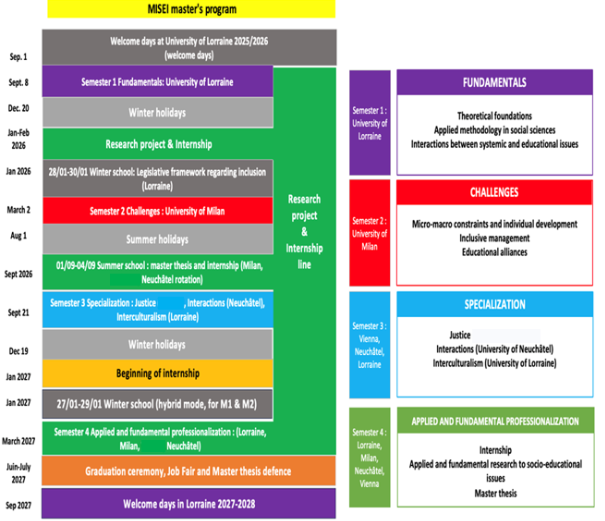Cette page est une description abrégée de la formation. Vous pouvez trouver toutes les informations détaillées sur la page du site du master MISEI.
MISEI degree is a double language master (English and French) aimingto train high-level students to become specialists in socio-educational inclusion issues and become the next generation of experts in inclusive education thanks to a unique international joint master program in Europe. Concretely, we ambition to qualify a new generation of experts and researchers to fuel new educational policies for a more inclusive society, with a focus on educational domain, with a development based on the identification of the current and anticipated needs in the field.
Socio-educational issues are compelling stakes for all the country in the North as well in the South. If for the first countries socio-educational they represent a very multidimensional topics, for the seconds the inclusion is a rising one.
MISEI program represents a response to UNESCO’s recommendations for SGDs[1] n° 4 “Quality Education”, n° 5 “Gender Equity”, n° 10 “Reduced Inequalities” and n° 16 “Peace, Justice and Strong Institutions”.

[1] Sustainable Development Goals
Diploma
Students will receive a diploma from the university where they have decided to defend their master’s thesis, plus a diploma supplement from all the other universities in the consortium.
The master is a two years degree with four semesters each of 30 credits (120 ECTS).
Exchanges with partner universities
Regarding the mobility path, all students will follow the same mobility path during S1 at UL and S2 at UCSC and have the opportunity to get a specialization track for S3.
We would like to remind you that it is essential to make at least two mobilities in two different universities. It is worth noting that if students choose to come back to UL in S3, their S4 (master thesis & internship) will need to be abroad to boost the mobility scheme and offer a minimum of 3 mobilities compared to only two mobilities.
The mobility plan will be decided at the beginning of the appointment during the construction of their Personal Career Development Plan. In parallel to the courses during the first three semesters, the Research Project Internship Line will last 18 months. The S4 is dedicated to the Master thesis and obligatory internship. In addition to these four semesters, the students will have a Welcome Day, a Winter School, a Master thesis defence, a summer school, a Job Fair and a Graduation Ceremony.
Organisation of the study periods (not contractual/provisional programme).

The time-sequencing of MISEI has been thoroughly designed so that the students progressively go towards the specialization. The first semester is thought as a basis for equalizing the level of the students, who come from different backgrounds and establishing robust knowledge of the theoretical foundations of inclusive education. The second semester is mainly devoted to challenges in inclusive education. Once the fundamental knowledge is mastered, the students can comfortably begin the third semester, where they will choose their specialization between Justice, Interactions, Interculturalism. The last semester is dedicated to the Master Thesis and internship, either in the academic or the non-academic sector.
Scholarships
MISEI is a joint master’s degree which welcomes 20 students who receive a monthly scholarship (€1,400) and 10 students who do not. Both categories will not have to pay the tuition fees of the universities where they will be studying.

